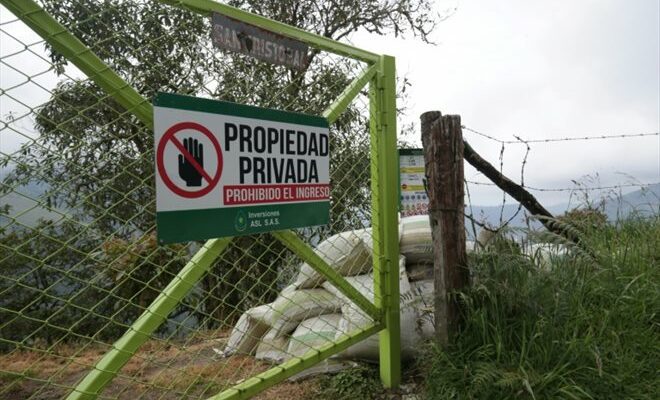Coffee farmer José Hernandez shows a ditch in his land caused by water spilled by a neighboring avocado farm, on February 8, 2023 in Pijao, in the department of Quindio, Colombia (AFP/Juan Pablo PINO)
Far from the guacamole that seduces the palates during the Super Bowl, the high mass of American football, the growing production of avocados in Colombia is dividing growers and arousing the concern of environmentalists.
Coffee grower in the department of Quindio (center-west), José Hernandez still refuses, unlike most of his neighbors, to plant “green gold”.
He accuses the avocado monoculture of having caused flooding on his land in Pijao.

Avocados in a plantation in Armenia, February 9, 2023 in the department of Quindio, Colombia (AFP / Juan Pablo PINO)
As his neighbors watered their avocado plantations, torrents of water poured down from the mountain, opening two-meter ditches and destroying his coffee trees.
This 64-year-old farmer says he lost some 4,000 coffee plants in this way.
“Twenty years of work has been wiped out”, because of the enormous quantities of water used in the avocado fields next door, by farmers who do not hesitate to divert all the rivers and tributaries in the area, protests he told AFP.
– “More important than oil” –
Mr. Hernandez is one of the few local farmers to have “resisted” the advance of the Hass avocado, a Colombian variety exported mainly to the United States, the Netherlands, Spain and the United Kingdom.

Aerial view of avocado and wax palm plantations on February 8, 2023 in Pijao, Quindio department, Colombia (AFP/Juan Pablo PINO)
Fans particularly appreciate it in the weeks leading up to the Super Bowl, in guacamole version, the star food of television viewers.
According to the Ministry of Agriculture, Colombia will send 1,432 tons to the United States, which will be consumed only during Sunday’s match between the Philadelphia Eagles and the Kansas City Chiefs.
In 2021, the country exported 97,000 tonnes of avocados for 55,000 hectares planted. It is the world’s third largest producer behind Mexico (2.3 million tonnes) and Chile (186,000).
As President Gustavo Petro claims that “avocados are more important than oil”, environmentalists warn of the pollution they cause in water sources, their invasion of protected areas and the grabbing of land from peasants who give in to the tempting offers of the multinationals.
In 2021, the “Corporacion Autonoma del Quindio”, a public body responsible for protecting the environment of this tropical mid-mountain region (famous for its tallest palm trees in the world), accused avocado producers of “taking water”, “contamination of water sources” and “illegal logging”.

An employee spreads lime around an avocado tree in a plantation on February 9, 2023 in Armenia, in the department of Quindio, Colombia (AFP/Juan Pablo PINO)
Historically a coffee-growing area, the locality of Pijao now has 789 hectares of avocado trees, or 245% more than seven years ago, according to the town hall. When the international price of beans fell, farmers found this a more profitable opportunity.
Diego Aristizabal, president of the National Federation of Avocado Producers, acknowledges that at first foreign companies were “unaware” of regulations on “environmental issues”, but now they comply with rules and legislation, says he.
– “Demonization” –
The representatives of this industry complain of a “demonization” of which they would be the victims, while they generate some 26,000 jobs.

Aerial view of the coffee plantation (d) of farmer José Hernandez, on February 8, 2023 in Pijao, in the department of Quindio, Colombia (AFP/Juan Pablo PINO)
For a local agribusiness engineer, speaking on condition of anonymity for fear of reprisals, those affected, like Mr. Hernandez, are many.
Avocado growers “cause overflows of water in neighboring farms”, which leads to “more erosion”, he said.
For local environmental activist Monica Florez, multinationals, mainly Chilean, Mexican and Peruvian, started arriving in Pijao in 2017, almost simultaneously with the disarmament of the FARC, a Marxist guerrilla that signed a peace agreement in 2016 and was here on his lands.
“We have seen the change, in land use, in the local economy and in the environmental impacts that these new companies have brought with them”, explains the director of the NGO “Pijao Cittaslow”.

Environmental activist Monica Florez during an interview with AFP in Pijao, Quindio department, Colombia, on February 8, 2023 (AFP/Juan Pablo PINO)
On the highest peak of the town, the paramo, a high altitude tropical biotope in the form of wet moorland, is shrinking because of the voracity of the avocado.
The use of pesticides “interrupts the natural cycle” of this wetland, from which flow two rivers, deplores the engineer.
In Mexico, avocado roads are undermined by violence, drug trafficking and deforestation.
In Michoacan, the largest avocado orchard, organized crime has taken over some of the business through robberies, kidnappings and extortion.
Chile is also experiencing a “green gold” boom that is spreading to arid lands, at the cost of a growing water deficit.
In Colombia, the armed conflict could well be added to this explosive cocktail.
Researchers from the University of Wisconsin and King’s College London have linked avocado expansion to the flight of small farmers from their farms, in a country where unequal land distribution has fueled violence for decades. decades.

A “Private Property” sign at the entrance to an avocado plantation on February 8, 2023 in Pijao, in the department of Quindio, Colombia (AFP/Juan Pablo PINO)
In Pijao, Mr. Hernandez says that he never heard from his former neighbors again. The powerful avocado producers want to “scare people away”, he accuses.
Meanwhile, the landscape of this famous coffee region, recognized by UNESCO, fades. The world’s third-largest bean producer had its worst harvest in 2022.
And in Pijao, “peasants are adrift,” says Ms. Florez.
© 2023 AFP
Did you like this article ? Share it with your friends with the buttons below.




